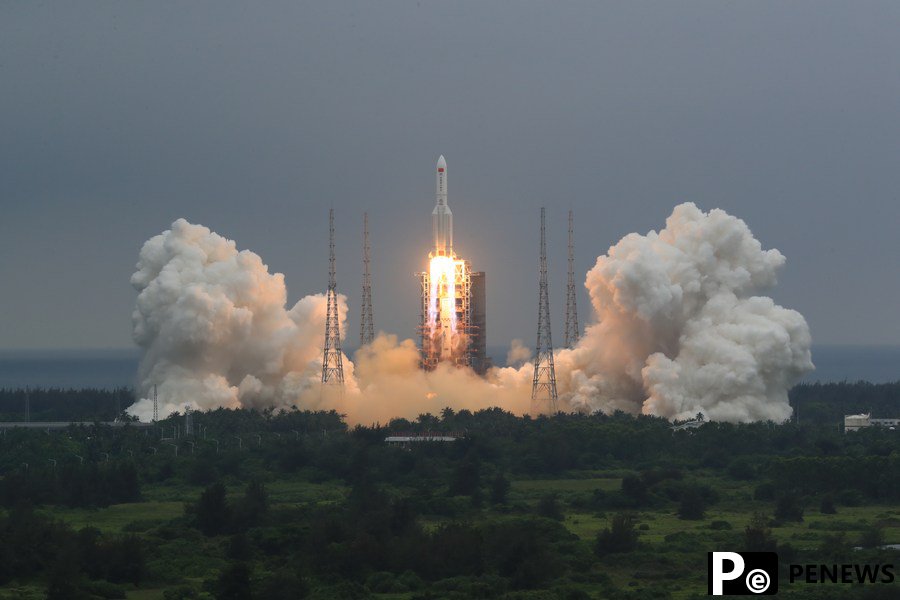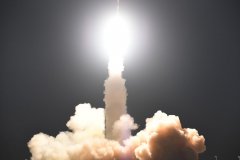Home>>
China's rocket debris falls to Earth as 'accurately predicted'(Global Times) 08:51, May 10, 2021
Most parts burnt up during reentry, 'common practice' of space powers

The Long March-5B Y2 rocket, carrying the Tianhe module, blasts off from the Wenchang Spacecraft Launch Site in south China's Hainan Province, April 29, 2021. China on Thursday sent into space the core module of its space station, kicking off a series of key launch missions that aim to complete the construction of the station by the end of next year. (Xinhua/Ju Zhenhua)
China's space authority announced on Sunday that remnants from China's Long March-5B Y2 carrier rocket reentered the Earth's atmosphere, most of it burning up on entry, with some remnants falling in the Arabian Sea.
Amid an intense China-US relationship and increasingly fierce competition in technology between the two great powers, some Americans have been racking their brains and grasping every chance to hype the "China threat" theory, with the latest episode being they accusing China of being "irresponsible" for leaving rocket debris "uncontrolled, causing threats to objects on Earth," despite the fact that it is a global common way to deal with rocket debris, practiced by all space powers including the US itself.
Chinese aerospace experts mocked that they felt "surprised" that some people would buy such absurd logic as it is common sense in the science field. Analysts of foreign affairs pointed out that it reflects the double standards of the West in an attempt to sabotage China's space station construction plan, exposing their military intentions to track China's space hardware.
'Completely normal'
Debris from China's Long March-5B Y2 carrier rocket reentered Earth's atmosphere at 10:24 am Beijing time on Sunday with most parts burning up during the process, China Manned Space Agency (CMSA) said. The location of the re-entry is 72.47 degrees east longitude and 2.65 degrees north latitude, indicating somewhere on the Arabian Sea west of the Maldives.
Despite clarification by China's space industry insiders and Foreign Ministry that the probability of the rocket remnants causing harm was extremely low, a number of Western media outlets, including CNN and The New York Times, as well as the US' Pentagon and NASA, claimed the debris was heading back to Earth in an "uncontrolled" manner and criticized China of being "irresponsible" for the ocean landing.
"The accusations were false, groundless," said Song Zhongping, an aerospace expert and TV commentator. "The so-called 'uncontrolled' trajectory refers to the loss of propulsion, but in no way means that China has lost track of its flight path and real-time location."
Every movement of the rocket fragments is being closely watched by China's space tracking network, and accurate predictions on its landing site were made accordingly and the flight course would avoid densely inhabited areas in the designing phase, Song told the Global Times on Sunday.
Wang Ya'nan, chief editor of Aerospace Knowledge magazine, said it is "completely normal" for rocket debris to return to Earth, and it is a common practice carried out by all global participants in the aerospace field, including the US.
"The wreckage's fall is within the normal range under widely accepted standards, with most parts burnt up during re-entry and a few were insufficiently burnt due to differences in the atmospheric environment," Wang said.
"Except for the SpaceX reusable rockets, all remnants from the first and second stages of traditional launch vehicles return to Earth in an uncontrolled manner. And all countries conducting such practice track the falling pieces and calculate their trajectories as China does," Wang noted.
The Tianhe space station core module's successful delivery to orbit has proven the reliability and controllability of the Long March 5B rocket, Wang added.
Following the successful launch of the Long March-5B Y2, which sent the first section of China's space station - Tianhe core module cabin - into orbit, China kicked off an intense construction phase of the country's first space station project, where a busy schedule of another 10 launches has been set for the next two years. The space station is expected to be operational by 2022.
Estimated to be the only operational space station in orbit that will be open to foreign partners after the retirement of the International Space Station scheduled in 2024, some Western countries, especially the US, are jealous of how rapidly China is growing in aerospace technology. "Therefore, any progress in the aerospace sector will touch a nerve in the US strategic community," Li Haidong, a professor at the Institute of International Relations at China Foreign Affairs University, told the Global Times on Sunday.








